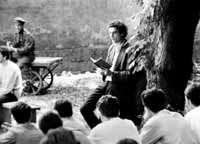!Revolution?
dal 27/9/2007 al 10/11/2007
Segnalato da
Balazs Bela Studio
Magyar Dezso
Alice Creischer
Andreas Siekmann
Latifa Echakhch
Raphael Grisey
Sandra Johnston
Khoor Lilla
Anna Artaker
Haraszti Gina
Kutvolgyi Lena
Bengt Sjolen
Tania Mouraud
Deimantas Narkevicius
Ines Schaber
Peter Watkins
Livia Paldi
27/9/2007
!Revolution?
Mucsarnok Kunsthalle, Budapest
The exhibition connects the substantial issues and forms of manifestation of revolutions along a time axis with the events preceding and following 1956 and with the current events of our days.

Artistic reflections on visual representation in mass media
The exhibition entitled !REVOLUTION? took place in the scope of the series of events in Germany commemorating the 50th anniversary of the 1956 revolution. Owing to the newly accessible historical documents and the accounts of contemporary witnesses, the exhibition could be interpreted as corresponding to the related events. Nevertheless, its objective was not the documentation of historical events or the commemoration of the ’56 revolution.
The exhibition presented works of art that, on the one hand, reflected on revolution as a phenomenon along with the modes of its representation in (mass) media, and, on the other hand, examined artistic modes of interpretation, (re)presentations in (mass) communication and the basic social conditions of revolution as a socio-politically definitive circumstance.
The exhibition !REVOLUTION? connects the substantial issues and forms of manifestation (such as demonstrations, spontaneous forms of expression, the role of media, publicity and their symbolic appearance) of revolutions along a time axis with the events preceding and following 1956 (the 1919 Soviet Republic of Hungary, the 1968 events in France and the Prague Spring) and with the current events of our days.
The selected works represent several methods which, with the help of formal and/or comparative analysis, endeavor to highlight some striking details in various correlations out of often baffling masses of information. At the same time, the artists direct attention at their own work, that is, artistic activity as a relevant political and social act, insomuch as they make the recipient conscious of the significant intermediary and social responsibility of their artistic activity.
The exhibition’s discursive endeavor is further emphasized by its architectural design, which gives ground to multiple interpretations of similar phenomena.
The Kunsthalle, Budapest hosts the third part of the exhibition (after Collegium Hungaricum, Berlin and Centre d'art Passerelle, Brest), augmented with new artists and artistic positions as well as historical materials.
Opening 27 september at 19
Mucsarnok Kunsthalle
Dozsa Gyorgy ut 37, Budapest
Free Admission



